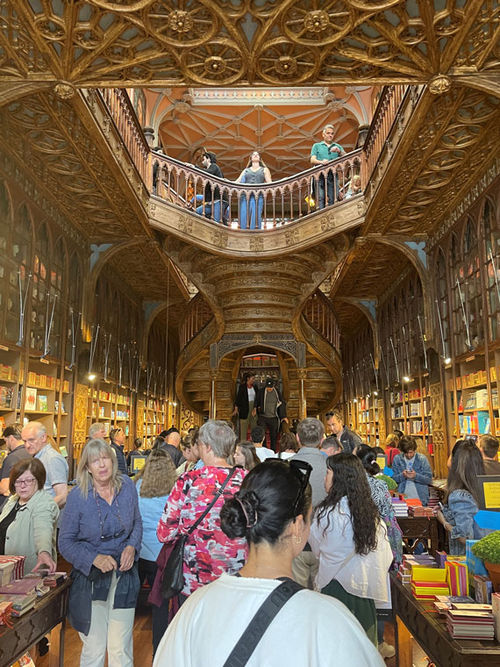
Arnie Weissmann
Before it expanded into, well, everything, Amazon started out selling only books. Brick-and-mortar bookstores were the first retailers to feel the pressure of Jeff Bezos' genius for online merchandizing.
Barnes & Noble shuttered many physical locations but was still able to compete online. Independent book sellers, however, already under pressure from big chains, were decimated by online book sales.
Decimated, but not extinct. Some survived by focusing on certain genres, while others, already highly regarded by bibliophiles, became places of pilgrimage: Powell's in Portland, Ore.; Librairie Mollat in Bordeaux, France; The Strand in New York; Blackwell's in Oxford, England; City Lights in San Francisco.
I've been to them all, but nothing prepared me for Livraria Lello in Porto, Portugal. It's a bookstore that charges $9 -- or more, as they've adopted surge pricing -- for the privilege of entering.
But you can't simply show up, pay and enter. You have to make a timed reservation on its website and hope a slot is still open when you want to go.

After paying and waiting: The view inside Livraria Lello bookstore in Porto, Portugal. Photo Credit: Arnie Weissmann
I had been advised to arrive earlier than my ticket indicated, and sure enough, there were two lines, each a block long, one for the previous entry time and one for mine. I didn't actually make it through the front door until 20 minutes after the time on my confirmation.
Part of its attraction is that it's said to have inspired the fictional Flourish and Blotts bookstore in the "Harry Potter" book series (J.K. Rowling had lived in Porto for a time). Once inside, that doesn't seem to be a far-fetched theory; the carved wood, stained-glass ceiling and, especially, the grand staircase of this late-19th-century building could easily have contributed to the imagining of Hogwarts.
It doesn't hurt that the owners are master marketers. In addition to a comprehensive section of every genre, they feature 13 bookcases of titles under their own imprint. They have a "Le Petit Prince" room and another for Portugal's only Nobel laureate for literature, Jose Saramago. They even sell a biography of the store itself.
So if a retailer of a commoditized product -- books -- can charge a fee, why are some travel advisors holding out, particularly when it has been shown that fees can add 12% to 14% to their bottom line?
Livraria Lello provided some insight. It's likely that many who don't charge fees are worried that if they do, they'll lose business to an agency that doesn't and which, in their minds, provides an identical service.
If that's how they see themselves -- identical to competitors -- they're probably right.
The object lesson of Livraria Lello is that it doesn't just sell books, it sells an experience that manifests as a bookstore, one so compelling that it requires up-front payment and possibly a long wait.
An advisor who sells an experience --travel -- but doesn't provide an experience during the sales process is missing an opportunity to charge fees that are justified by the process alone. Competence and knowledge are, of course, table stakes for any agency, but combine them with crafting an exceptional sales process, whatever that means to you, and it might result in hard-to-get appointments or perhaps even a waitlist for the privilege of paying fees.
• • •
When I was in Porto, I arranged to see municipal councilor Catarina Santos Cunha, who heads the city's tourism efforts.
Porto is a unique and beautiful destination, so much so that one fears it could be headed toward notoriety akin to other beautiful and unique destinations like Venice, Barcelona and Dubrovnik.
Indeed, Santos Cunha showed me arrival numbers for the first quarter of the year, which are up 11% over last year's record numbers. Is she, I wondered, concerned with the potential for overtourism?
Initially, she responded as a promoter would: "I'm quite sure that people are happy to welcome all these people to the city. It's very important for the economic development of Porto."
As the conversation progressed, however, she became more nuanced: "All the country is celebrating tourism. But I'm always reminding people that we need to be a little concerned about the kind of people we attract. We are a small city; it's very important to study to see exactly where people are moving and what they're doing."
The city is, she said, working with neighborhoods to "spread and decentralize the flow of tourists."
As the interview was winding down, she allowed that "I'm a little bit concerned for the future. Because it can all go in seconds, in the blink of an eye. I've been in discussion groups with Barcelona, with Venice, and we're sharing best practices."
Combining promotion with proactive efforts to keep a visit to Porto pleasant has a commonality with advisors charging fees. The "experience economy" has benefited travel immensely. My visit to Porto reinforced the importance not only of the in-destination experience but of the experience that advisors provide to clients before sending them on their way.